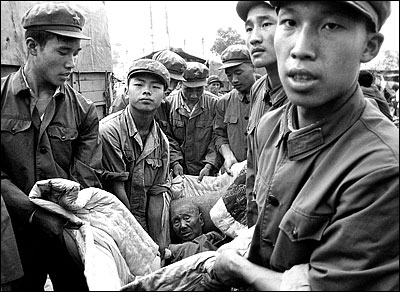| Home / China / Full Coverage / Tangshan Earthquake -- 30 Years On | Tools: Save | Print | E-mail | Most Read |
| Tangshan Earthquake -- 30 Years' Sorrow |
| Adjust font size: |
Xu Xuejiang, the man who blew the whistle on the death toll from the Tangshan earthquake 30 years ago, recently recounted how he broke his silence to reveal that the quake had claimed 240,000 lives, a figure that had kept secret for three years. The Tangshan earthquake, which devastated north China's Hebei Province in 1976, was an event surrounded by speculation, guesswork and rumors because no official information about what had actually happened or casualties sustained was made available. Xu considers his experience is still relevant to today's China, which has just drafted a law targeting local officials guilty of cover-ups and media that give incorrect information about disasters, accidents and other emergencies. In November 1979, Xu, then a reporter with Xinhua News Agency and later deputy chief editor, inadvertently got wind of details about the earthquake at the inaugural meeting of China's Seismological Society held in Dalian, a port city in northeast China's Liaoning Province. It was the first time that official figures from the Tangshan earthquake were made available. "It was a big story that the country and the world had long been waiting for. I felt I had to use every possible means to bring it to the public," Xu said. He quickly wrote a story and submitted it to the meeting's general secretary, then an official with the State Seismological Bureau, for further verification. But some persuasion on his part was necessary: "The earthquake happened more than three years ago. There has been too much hearsay because no official statistics have yet been released. The Hong Kong media even claimed that the death toll was over 700,000. It's better to tell the truth rather than cover things up," Xu said to the general secretary. "This meeting is a good opportunity. If the news comes from a conference on seismology, it looks more natural than an abrupt official announcement and means that no explanation about the three-year postponement is needed," Xu wheedled. Xu had to further convince the official that time was of the essence: "It must be published today, and will lose a lot of impact if delayed." "It's not a man-made disaster, and the deaths have no direct relation with the government," Xu insisted. The general secretary, finally convinced, did not seek instructions from higher-level officials and approved the story for publication by Xinhua. The story shocked the country and generated sharp criticism. Some government departments argued that Xinhua ought not to have "divulged a state secret." Xinhua, however, firmly supported Xu's decision to report the story. Xu said that, on the 30th anniversary of the earthquake, it is worth looking back at this unusual experience. "I hope that both the government and the media will learn a lesson from this and further improve coverage of major natural disasters and other emergencies," he said. Reporting deaths from natural calamities used to be taboo for government officials. Analysts believe that during the planned economy period from the early 1950s to the late 1970s, the government feared that exposing death figures might tarnish its image, draw blame from the public, or trigger social turmoil. But the outbreak of Severe Acute Respiratory Syndrome (SARS) in 2003, and in particular the sacking of the mayor of Bejing and Minister of Health for covering up the death toll during the crisis, has prompted the government to become more transparent. Last September, the National Administration for the Protection of State Secrets and the Ministry of Civil Affairs jointly declared that death tolls in natural disasters and related information were no longer state secrets. "Society is progressing," Xu said, adding that the government has now established "openness", "transparency" and "people first" as its new principles of governance.
(Xinhua News Agency July 28, 2006)
|
| Tools: Save | Print | E-mail | Most Read |
 |
| Related Stories |

